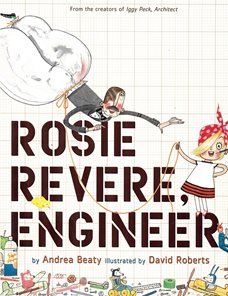This month’s Book Nook topic is...
Building Vocabulary with Rosie Revere, Engineer


Written by Andrea Beaty
Illustrated by David Roberts
|
We all want children to become strong readers. Did you know that a key predictor of reading success is a child’s vocabulary? Children who understand more words become better readers! Books are a great way to expose young children to new words that they may not hear in everyday conversation. But just hearing new words isn’t enough. Children must understand what a word means for it to become part of their vocabulary. In this Book Nook, discover ways to draw a child’s attention to new words and highlight their meaning.
Let’s get started!
|
Why we chose this book
This inspirational book is about a little girl who dreams of becoming an engineer, spending much of her time building great inventions. The rhyming story is easy to follow, includes detailed illustrations and introduces children to a variety of new, sophisticated words. We think you’ll be captivated by Rosie’s determination to become a great engineer.
Building Vocabulary – One Step at a Time!
Once a child understands basic, everyday words, we can start stepping up their vocabulary. Stepping up means you identify words that are more sophisticated and unfamiliar to the child. These are the words you want to highlight and add to their vocabulary.
This book has several sophisticated words to choose from. For example, children may know what it means to be “unsure” or “confused.” But do they know what it means to be “perplexed” or “baffled”? To deepen children’s understanding of a new word, you can use a Hanen strategy we call Shoot for the SSTaRS!
Highlight New Words by Shooting for the SSTaRS
In our ABC and Beyond™ and I’m Ready!™ guidebooks, we talk about making new words sparkle, or stand out, using a strategy called SSTaRS – an acronym that stands for:
Stress
Say the new word louder and slower than the rest of the text. For example, you emphasize the word “engineer” on the cover of the book.
Show
- Highlight the meaning of a new word like perplexed using illustrations, gestures, your tone of voice or an object. For example, you could point out Rosie’s confused face when her Great-Great-Aunt Rose hugs her after her cheese-copter crashes.
- Encourage the child to think about how Rosie is feeling. Then, add to the child’s ideas using the new word. For example, “You’re right, Rosie doesn’t know what to think. She is perplexed!”
Tell
Give a short definition of the word and/or say what the word is not. For example, “Perplexed means Rosie is confused! She’s not sure why her aunt is laughing.” Or, “An Engineer is someone who designs and builds things.”
and Relate
Help the child connect this word to their experiences or knowledge. For example, “Remember when we saw the magician make the rabbit appear in his hat? We were so perplexed! We didn’t understand how he did that!”
Say it again
- Repeat the word when you re-read the book.
- Use the word in other, everyday situations. For example, the next time the child builds with Lego or blocks, talk about how they are just like an engineer designing and building those structures.
Increase Success by Re-reading Books
To keep the story engaging and avoid overwhelming the child, you should introduce new vocabulary slowly.
- Focus on the story the first time you read it with the child – don’t introduce any new vocabulary.
- Once they are familiar with the story, choose a few words (no more than five) to highlight while you read.
- Pick a new word or two each time you read the story together.
- Use the SSTaRS strategy and watch the child’s vocabulary grow.
Happy reading!
More resources
The strategies in this Book Nook post are drawn from Hanen’s practical, research-based guidebooks for building emergent literacy. Explore the links below to learn more about how these guidebooks can support you.
We’ll let you know when a new Book Nook topic
has been posted!
Return to Book Nook